

Learner led learning research. This is a short version of a complex topic - you'll have to wait for my iBook for the longer version.
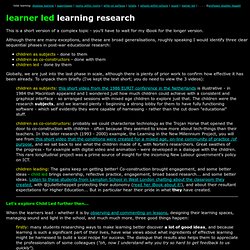
Although there are many exceptions, and these are broad generalisations, roughly speaking I would identify three clear sequential phases in post-war educational research: children as subjects - done to them children as co-constructors - done with them children led - done by them Globally, we are just into the last phase in scale, although there is plenty of prior work to confirm how effective it has been already. To unpack them briefly (I've kept the text short; you do need to view the 3 videos): children as subjects: this short video from the 1986 EURIT conference in the Netherlands is illustrative - in 1984 the Macintosh appeared and I wondered just how much children could achieve with a consistent and graphical interface - so arranged sessions with mixed age children to explore just that.
Let's explore Child Led further then... So how do we action this? In every case, you need a budget. Promoting a Culture of Learning. Learning is a culture.
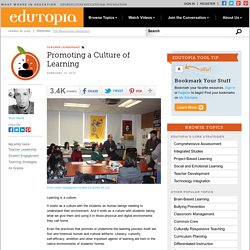
It starts as a culture with the students as human beings needing to understand their environment. And it ends as a culture with students taking what we give them and using it in those physical and digital environments they call home. Even the practices that promote or undermine the learning process itself are first and foremost human and cultural artifacts. Literacy, curiosity, self-efficacy, ambition and other important agents of learning are born in the native environments of students' homes. Further, learning is ongoing, perishable and alive -- just like culture. Creating Culture But what about your classroom? Project-Based Learning Leads to Innovation - Global Learning. Blooms-Taxonomy.
Pedagogy. Display. Morphing into a 21st century teacher. Peer-to-Peer Learning Handbook. The 7 Powerful Idea Shifts In Learning Today. By Terry Heick, TeachThought.com : Shift_Learning: The 7 Most Powerful Idea Shifts In Learning Today So we’re taking a stand here.
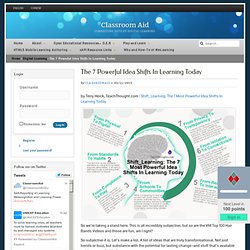
This is all incredibly subjective, but so are the VH1 Top 100 Hair Bands Videos and those are fun, am I right? So subjective it is. Let’s make a list. A list of ideas that are truly transformational. Utopian visions of learning are tempting, if for no other reason than they absolve us of accountability to create itright now, leading to nebulous romanticizing about how powerful learning could be if we just did more of X and Y. But therein lies the rub: Tomorrow’s learning is already available, and below are 7 of the most compelling and powerful trends, concepts, and resources that represent its promise. The Challenge of Implementation It’s challenging enough to manage a traditional learning environment where the curriculum is handed to you, and meetings are set, and you’re simply there to manage; adding more ingredients to the mix seems like asking for trouble.
Great Lessons 9: Possibilities. The sky’s the limit….

“The sky’s the limit”…… It’s a wonderful motivating phrase. It suggests that anything is possible; that there are no limits. How Do We Define and Measure “Deeper Learning”? Big Ideas Culture Teaching Strategies Flickr:Saxtourigr In preparing students for the world outside school, what skills are important to learn?
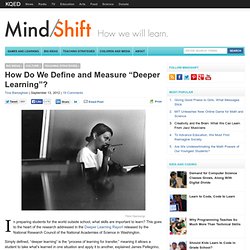
This goes to the heart of the research addressed in the Deeper Learning Report released by the National Research Council of the National Academies of Science in Washington. Simply defined, “deeper learning” is the “process of learning for transfer,” meaning it allows a student to take what’s learned in one situation and apply it to another, explained James Pellegrino, one of the authors of the report. “You can use knowledge in ways that make it useful in new situations,” he said in a recent webinar. To deconstruct the definition of deeper learning further, the researchers came up with what they call three domains of competence: cognitive, intrapersonal and interpersonal. Inclusive Questioning. I today read an excellent blog by @headguruteacher on differentiation, which defined it as a key aspect of great lessons – see here.
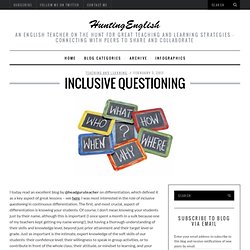
I was most interested in the role of inclusive questioning in continuous differentiation. The first, and most crucial, aspect of differentiation is knowing your students. Of course, I don’t mean knowing your students just by their name, although this is important (I once spent a month in a sulk because one of my teachers kept getting my name wrong!) , but having a thorough understanding of their skills and knowledge level, beyond just prior attainment and their target level or grade. The Literacy Shed - The Literacy Shed Home. Go with the flow: the 2 minute lesson plan.
NB: This post does no longer represents my latest thinking.

I’ve updated my approach to planning here. Like all teachers, my main aim in life is to run, whooping, out of the school gates by 3 o’clock. Teaching and Learning Strategies. This page is an attempt to collate my posts which are explicitly all about different teaching and learning strategies I have compiled.
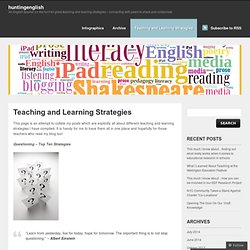
It is handy for me to have them all in one place and hopefully for those teachers who read my blog too! Questioning – Top Ten Strategies “Learn from yesterday, live for today, hope for tomorrow. The important thing is to not stop questioning.” – Albert Einstein. TeacherTalk « @TeacherToolkit. We all love to talk in the classroom!
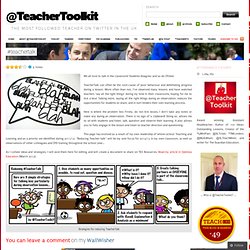
Students disagree; and so do Ofsted. TeacherTalk can often be the root-cause of poor behaviour and debilitating progress during a lesson. More often than not, I’ve observed many lessons and have watched teachers ‘say all the right things’ during my time in their classrooms, hoping for me to tick a box! Talking more, saying all the right things during an observation, reduces the opportunities for students to share, and in turn hinders their own learning process. Here is where the problem lies: Firstly, do not tick boxes.